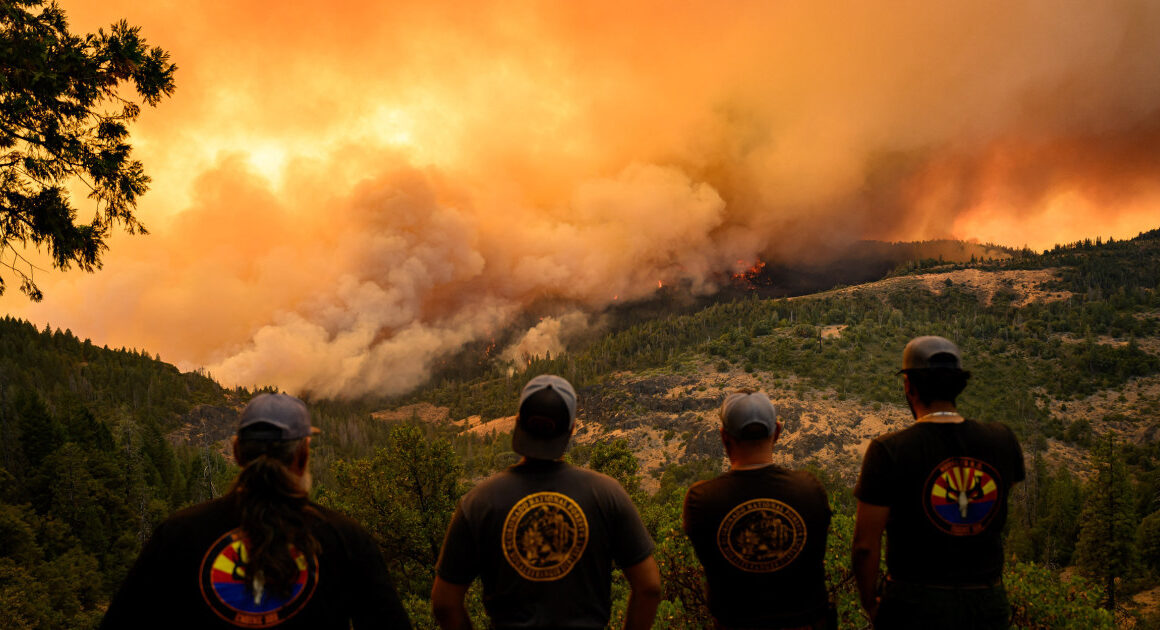The Summary
- Studies have found that wildfire smoke negatively affects brain health.
- New research suggests that increased exposure to smoke is associated with a higher risk of dementia.
- As wildfires become more frequent and intense due to climate change, so does many people’s exposure to smoke — and the health risks that come with it.
Parts of California, Oregon and Montana are facing unhealthy levels of air pollution as several large fires blaze, including Northern California’s Park Fire, which has quickly ballooned into the fifth largest in the state’s history.The smoke poses a hazard for people in the immediate vicinity and even some far away, as wildfire smoke can travel hundreds or thousands of miles.
The tiny particles in that smoke aren’t just bad for your lungs — a spate of studies over the last few years have found that it also negatively affects brain health, raising the risk of dementia, cognitive challenges and mental health issues.
“A lot of the research on wildfire smoke has historically focused on our lungs and our hearts,” said Stephanie Cleland, an assistant professor at Simon Fraser University who studies the health impacts of wildfire smoke. “A shift to focusing on cognitive outcomes and brain health is more recent.”
The latest addition to this body of evidence: Research presented Monday at the Alzheimer’s Association International Conference suggests that wildfire smoke could raise the chances of a dementia diagnosis.
The study analyzed the health records of more than 1.2 million older adults — ages 60 and up — in Southern California from 2009 to 2019.
The researchers looked at where people lived to determine their exposure to fine particulate matter from wildfire smoke and other forms of pollution. Their results showed that the odds of getting dementia went up 21% for every additional microgram per cubic meter of fine particulate matter from smoke that participants were exposed to, on average, over three years.
By contrast, the same increase in exposure to fine particulate matter from other sources — like cars or factories — was linked to a 3% increase in the odds of getting dementia.
The evidence is preliminary, but it makes the case that chronic exposure to wildfire smoke contributes to cognitive decline, said Dr. Holly Elser, the study’s author and a neurology resident at the Hospital of the University of Pennsylvania.
However, she said, “the threshold at which wildfire smoke starts to pose a risk for dementia is unknown.”
A study published in August similarly found that higher exposure to fine particulate matter from various sources, including wildfires, was associated with higher rates of dementia.
Wildfires are becoming more frequent and intense due to climate change — which also increases many people’s exposure to smoke. The frequency of extreme wildfires more than doubled from 2003 to 2023, a recent study found.
Scientists think the reason wildfire smoke affects the brain is that the tiny particles within it can cross the barrier between the bloodstream and the brain, causing inflammation in the central nervous system. The particles might also travel directly to the brain via the nose. That, in turn, may affect people’s ability to think, learn or remember.Dementia isn’t the only potential consequence. A study in 2022 found that adults who’d recently been exposed to wildfire smoke performed worse on a brain training game that measured skills like memory, attention, flexibility, processing speed and problem solving.
“Within hours and days of exposure to wildfire smoke, we’re seeing significant reductions of people’s ability to pay attention,” said Cleland, one of the study’s authors.
Other research published the same year showed that exposure to wildfire smoke during the school year reduced students’ test scores relative to a year with no smoke.
“The more smoke you get, the worse you do on the tests,” said Marshall Burke, an associate professor of global environmental policy at Stanford University, who co-authored that study. “The effect on any individual student is probably pretty small, but if you add up across students and add up across schools, these amount to pretty large overall aggregate learning losses.”
Burke said he has some doubts about the dementia findings released this week, however, because wildfire smoke and other forms of pollution are “not an apples-to-apples comparison.”
Elser acknowledged that many questions remain about smoke’s effects on the brain. It’s unclear, for example, whether smoke triggers dementia in healthy people or just among those who were already at risk.
“It’s a really intriguing question, whether this is creating new dementia cases that never would have occurred, or whether it’s simply accelerating the onset of clinically apparent dementia,” she said.
Other lingering questions pertain to the link between wildfire smoke and mental health. A February study found that exposure to wildfire smoke in the western U.S. was associated with increased emergency department visits for anxiety. (Air pollution in general has been shown to be associated with depression and psychotic disorders like schizophrenia.)
Elser said it’s possible that wildfire smoke changes the neurochemistry in people’s brains, which could drive depression and anxiety. But it’s also possible that the anxiety and stress of experiencing or living through a wildfire could independently lead to mental health challenges.
Other health consequences of wildfire smoke are much better understood. Scientists have known for decades that when fine particles from smoke are inhaled, they can travel deep into the lungs or enter the bloodstream, raising the risk of asthma, stroke, heart attack, lung cancer and low birth weight in newborns.
Cleland said it’s not just people in fire-prone areas of the U.S. who have to worry about these risks, as evidenced by the Canadian wildfires last summer that blanketed parts of the Midwest and Northeast in smoke.
“Last summer completely changed our conversation around who’s exposed to wildfire smoke,” she said. “Oregon, California, Washington, British Columbia really experience a lot of wildfire smoke, but that doesn’t mean places like the Northeast U.S. or Ontario are immune.”
To reduce exposure to wildfire smoke, experts recommend that people in areas with an Air Quality Index reading of 100 or higher avoid outdoor activities, close all windows, run indoor air filters and wear an N95 mask if they need to go outside.
,









